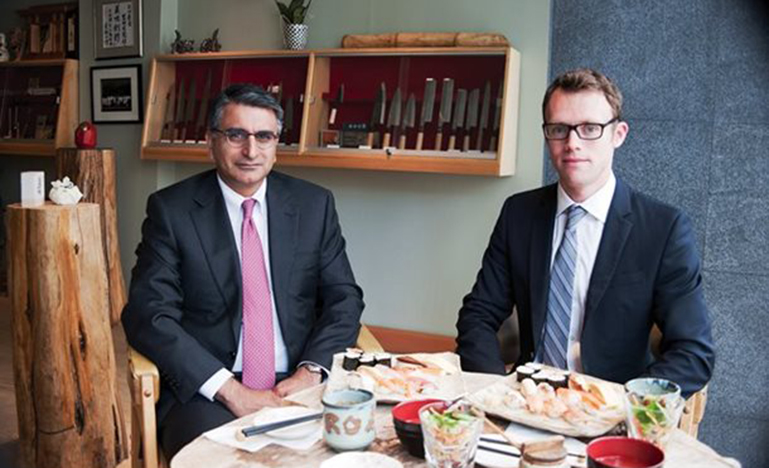Lunch with Mahmud Jamal and W. David Rankin
Lessons in advocacy – with a side of sushi.

THE DINERS
The partner: Mahmud Jamal, Litigation Partner, Osler Hoskin & Harcourt LLP, Toronto
Background: Jamal has argued 32 appeals before the Supreme Court of Canada. He is pro bono counsel for the CBA in the case of AG Canada v. Chambre des notaires du Québec, scheduled to be heard by the top court in November
The associate: W. David Rankin, Litigation Associate, Osler Hoskin & Harcourt LLP, Toronto
Background: Rankin joined Osler in 2012 after serving as a law clerk to Mr. Justice Morris J. Fish of the Supreme Court of Canada. He carries on a general commercial litigation practice.
“All litigators are storytellers,” says Mahmud Jamal over lunch at Hiro Sushi on Toronto’s busy King Street. The most interesting part of legal practice, he adds, “is going into a new case where there is a trial or appeal and seeing confusion and gradually organizing the shape of the narrative and seeing the confusion dissipate. That’s very enjoyable and satisfying.”
It takes a slight effort in the quiet restaurant to hear the soft-spoken litigator as he answers questions from his junior colleague David Rankin. The mentor-mentee relationship, Rankin believes, is critical to develop both technical legal skills and the intangibles that lead to success. “Lawyers always benefit when they seek the advice of their colleagues,” he remarks.
Jamal emphasizes the importance of apprenticing to learn your craft, starting with factum writing, which is more challenging than it appears. He tells Rankin to learn how to frame an issue, write a factum and present an appeal effectively. “It’s much harder to overcome an inadequate factum in oral argument than it is to supplement a strong factum with oral argument,” he says.
Take time to get command of a case’s basic facts before organizing it and figuring out the best narrative arc. Think about what storyline will appeal to the judges’ sense of equity and fairness. Imagine the eventual judgment. “Visualizing what it’s going to look like in the law reports is a very useful exercise because it puts in mind the end product of what the judges’ task will be,” he suggests.
Jamal also remembers a valuable lesson from his mentor, Edgar Sexton, about the importance of treating everyone with courtesy and respect. A client from the opposing side asked Sexton whether he would be open to representing him in a future case. “What impressed me was the courtesy and openness to seeing a person that he just litigated against as a potential future client,” says Jamal. “Do the best job you can in every instance because somebody may be watching you in court.”
One of the most difficult challenges he has faced: being bombarded with questions from the bench. His advice: Use them as “an opportunity to pivot onto your main arguments” and give judges the answers they need to do their jobs. “Sometimes,” he says, “the judge may be actively trying to assist you or to persuade one of their colleagues. Sometimes the court just wants clarification on a particular point. It’s not necessarily intended to trip you up.”
He adds that although the facts win cases, it’s important to appeal to a judge’s sense of fairness. He recalls watching his mentor get embroiled with a judge about a question of statutory interpretation. “Rather than descend too far down that path, he took the court back to the sense of fairness that his position entailed. And it was very effective. I think at the end of the day, many judges reach outcomes and interpretations guided by their sense of fairness.”
When Rankin asks how junior lawyers can best get involved in arguing appeal cases, Jamal recommends speaking up and being available when the opportunities arise.
He tells young lawyers to “find their passion, envision what they want to be and do, then take steps to implement that vision. Accelerate the process simply by doing really excellent work and being known for researching and writing really great factums.”
As we prepare to leave the restaurant, he advises Rankin to “try and enjoy the journey and don’t worry so much about the outcome. The outcome will take care of itself.”


